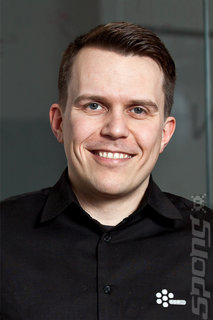Companies:
CCP
People: Jon Lander Kristoffer Touborg Sveinn Johannesson Kjarval
Games: Eve Online (PC)
People: Jon Lander Kristoffer Touborg Sveinn Johannesson Kjarval
Games: Eve Online (PC)
Think of an MMO. You probably thought World of Warcraft, right? Well, while Blizzardís massively popular fantasy title may be the first thing that comes to your mind, thereís another MMO that pre-dates it by about a year or two. Its name is EVE Online, and has been very successful in its nine-year run. Why? Because the game offers players no limits.
This is true in both a metaphorical, physical and political sense. Set in a vast galaxy, players literally have an entire universe to explore. There are no player level caps, set classes or job descriptions - players decide what they want to do for themselves. And the developers, CCP, have a policy of not getting involved when communities fight, grief, steal, scam or otherwise cause havoc on their servers.
Itís as brave a new world for gaming today as it was when it was released - and now the European studio is developing a companion First Person Shooter on PlayStation 3 called Dust 514. In my absolutely huge interview with Senior Producer Jon Lander, Lead Game Designer Kristoffer ĎStofferí Touborg and Lead Community Developer Sveinn Johannesson Kjarval, I touch on Dust 514 a little later.
What I wanted to discuss first, was the history of EVE and how the premise of allowing players to do whatever they wanted came about. And whether the developers think itís a good idea.
SPOnG: Would you say EVE was the first big MMO to hit PC?
Jon Lander: Well, I think we were out about a year before World of Warcraft... we were certainly one of the first proper ones. I mean, you look at Ultima Online and the old-school games, which have been hugely influential to us when making EVE. So I wouldnít say we were the first, by a long shot. But in terms of the kind of incredible visuals, a real reason to team up and actually interact with other players... weíre actually quite unusual, in that youíre not going to get a huge amount out of EVE if youíre a solo player.
So, EVE is almost like the atypical MMO, in that we do a lot of things very, very differently to something like World of Warcraft. We are a niche game and quite happy to be so. Itís a difficult, tough game - loss has a real meaning in EVE. You have to work with other people to get anywhere in the game. So it really brings the ĎMassivelyí part into the term MMO.
On May 6th, weíll have been running for nine years, growing every year - which nobody else can really say. The real reason behind that is because itís a world that people care about when they actually play it. We find that we donít get many people who... well, we actually get a lot of people who come in and try the game for a week or two and say, ĎThis isnít for me.í But once people get into the game, they stay with us for years. Itís not like a six-month thing. We donít have people who stay for six months and then disappear. Youíre in this for five years.
And it all comes down to the fact that you make a huge number of friends, the commitment of meeting other people and working together for a common goal - to actually achieve something. Itís something which is very strong in EVE. I guess in terms of defining the MMO space, weíve defined part of it, where the game we create actually isnít the important bit. Itís the story that the players create, and the content that the players actually deliver. Thatís the important thing, thatís what gets reported.
We talk about an expansion a couple of times a year, but itís actually the thing that people latch onto in EVE are the player-made stories. So a lot of what we end up doing is just giving people the tools and the framework to do whatever they want.
SPOnG: EVE has a bit of a reputation though, doesnít it? Itís a very lawless land. People hijacking each otherís ships, stealing loot that they paid money for... itís quite sociopathic in a way. Is that intentional?
Jon Lander: Yeah. I mean, that makes all the noise - because normally, MMOs are all about ponies and rainbows and all these happy things. EVE has that reputation because we allow an awful lot of stuff to happen in the game which we just donít want to interfere with. A lot of that is people just letting the worst excesses of the internet prevail. I can scam you, I can grief you, I will take pleasure from doing that - I get a gaming experience from it.
But thereís also the side of things that you donít hear so much about - users like Cribber, who is known for his reputation as the Ďguy you can trustí to give a huge amount of money to in exchange for a really big ship.
Kristoffer Touborg: Yeah, he tends to be the middleman in all kinds of large transactions in the game.
Jon Lander: There are also people who trade on their reputation alone - because if youíve been playing this game for nine years and have never done a bad thing in this game at all, people will trust you. Reputation is a big part of it. Some people trade on their reputation of being a dick, some people trade on being a spy, some on being a mercenary, others as the Ďwhiter than whiteí guy. But often, the good guys donít make for particularly good news.
Kristoffer Touborg: One of the big alliances, Iíve just read, has formed a ĎDeath Star.í This alliance in particular is a group of players who are known for making the lives of their enemies miserable. They have a list of five names that they donít like, along with a number of players whose sole task is to hunt those targets down, wherever they go in the game. And... I kind of like it. Of course, having a group of players to harass someone else is an awful thing, but itís also player enforcement.
You have people who sit in a safe part of space and post bad things about this alliance. Should we, as game creators, step in and say, ĎYou canít say those thingsí? Or should we give the players the tools to enforce the consequences themselves?
In this case, this group has just said, ĎWell, we donít like these people, so weíre just going to go after them.í I like that solution much better, than having us impose some mechanical restriction on things. I think itís interesting - things are about to kick off, and Iím curious to see what happens.
This is true in both a metaphorical, physical and political sense. Set in a vast galaxy, players literally have an entire universe to explore. There are no player level caps, set classes or job descriptions - players decide what they want to do for themselves. And the developers, CCP, have a policy of not getting involved when communities fight, grief, steal, scam or otherwise cause havoc on their servers.
Itís as brave a new world for gaming today as it was when it was released - and now the European studio is developing a companion First Person Shooter on PlayStation 3 called Dust 514. In my absolutely huge interview with Senior Producer Jon Lander, Lead Game Designer Kristoffer ĎStofferí Touborg and Lead Community Developer Sveinn Johannesson Kjarval, I touch on Dust 514 a little later.
What I wanted to discuss first, was the history of EVE and how the premise of allowing players to do whatever they wanted came about. And whether the developers think itís a good idea.
SPOnG: Would you say EVE was the first big MMO to hit PC?
Jon Lander: Well, I think we were out about a year before World of Warcraft... we were certainly one of the first proper ones. I mean, you look at Ultima Online and the old-school games, which have been hugely influential to us when making EVE. So I wouldnít say we were the first, by a long shot. But in terms of the kind of incredible visuals, a real reason to team up and actually interact with other players... weíre actually quite unusual, in that youíre not going to get a huge amount out of EVE if youíre a solo player.
So, EVE is almost like the atypical MMO, in that we do a lot of things very, very differently to something like World of Warcraft. We are a niche game and quite happy to be so. Itís a difficult, tough game - loss has a real meaning in EVE. You have to work with other people to get anywhere in the game. So it really brings the ĎMassivelyí part into the term MMO.
On May 6th, weíll have been running for nine years, growing every year - which nobody else can really say. The real reason behind that is because itís a world that people care about when they actually play it. We find that we donít get many people who... well, we actually get a lot of people who come in and try the game for a week or two and say, ĎThis isnít for me.í But once people get into the game, they stay with us for years. Itís not like a six-month thing. We donít have people who stay for six months and then disappear. Youíre in this for five years.
And it all comes down to the fact that you make a huge number of friends, the commitment of meeting other people and working together for a common goal - to actually achieve something. Itís something which is very strong in EVE. I guess in terms of defining the MMO space, weíve defined part of it, where the game we create actually isnít the important bit. Itís the story that the players create, and the content that the players actually deliver. Thatís the important thing, thatís what gets reported.
We talk about an expansion a couple of times a year, but itís actually the thing that people latch onto in EVE are the player-made stories. So a lot of what we end up doing is just giving people the tools and the framework to do whatever they want.
SPOnG: EVE has a bit of a reputation though, doesnít it? Itís a very lawless land. People hijacking each otherís ships, stealing loot that they paid money for... itís quite sociopathic in a way. Is that intentional?
Jon Lander: Yeah. I mean, that makes all the noise - because normally, MMOs are all about ponies and rainbows and all these happy things. EVE has that reputation because we allow an awful lot of stuff to happen in the game which we just donít want to interfere with. A lot of that is people just letting the worst excesses of the internet prevail. I can scam you, I can grief you, I will take pleasure from doing that - I get a gaming experience from it.
But thereís also the side of things that you donít hear so much about - users like Cribber, who is known for his reputation as the Ďguy you can trustí to give a huge amount of money to in exchange for a really big ship.
Kristoffer Touborg: Yeah, he tends to be the middleman in all kinds of large transactions in the game.
Jon Lander: There are also people who trade on their reputation alone - because if youíve been playing this game for nine years and have never done a bad thing in this game at all, people will trust you. Reputation is a big part of it. Some people trade on their reputation of being a dick, some people trade on being a spy, some on being a mercenary, others as the Ďwhiter than whiteí guy. But often, the good guys donít make for particularly good news.
Kristoffer Touborg: One of the big alliances, Iíve just read, has formed a ĎDeath Star.í This alliance in particular is a group of players who are known for making the lives of their enemies miserable. They have a list of five names that they donít like, along with a number of players whose sole task is to hunt those targets down, wherever they go in the game. And... I kind of like it. Of course, having a group of players to harass someone else is an awful thing, but itís also player enforcement.
You have people who sit in a safe part of space and post bad things about this alliance. Should we, as game creators, step in and say, ĎYou canít say those thingsí? Or should we give the players the tools to enforce the consequences themselves?
In this case, this group has just said, ĎWell, we donít like these people, so weíre just going to go after them.í I like that solution much better, than having us impose some mechanical restriction on things. I think itís interesting - things are about to kick off, and Iím curious to see what happens.
Companies:
CCP
People: Jon Lander Kristoffer Touborg Sveinn Johannesson Kjarval
Games: Eve Online (PC)
People: Jon Lander Kristoffer Touborg Sveinn Johannesson Kjarval
Games: Eve Online (PC)




